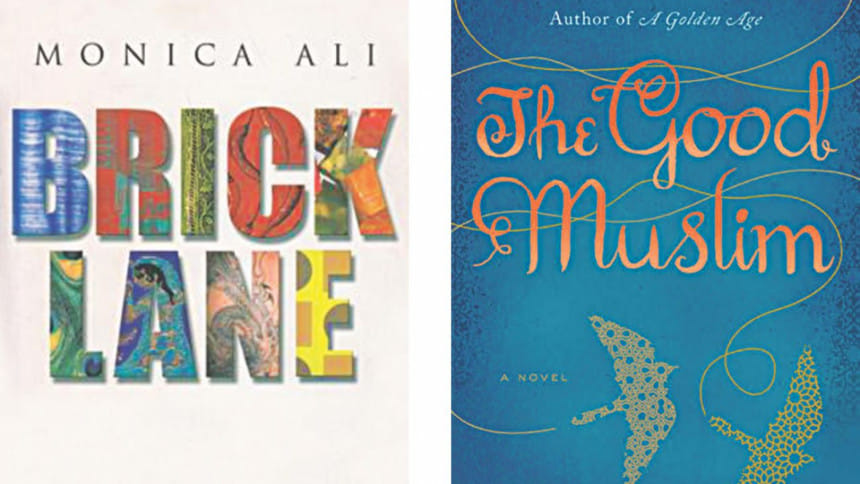Religion, Diaspora and the Politics of a Homing Desire

Let me dedicate my inaugural musing in this page to the writers of the Bangladeshi diaspora spread all over the world; after all, I myself speak as a diasporic woman who has spent her whole life learning how to keep her steps unflinchingly steady, and walking through the shifting grounds of [un]homelands, wearing shoes of melting hot iron and speaking in shredded tongues about my multifaceted consciousness.
The diasporic concept of home is more than an unrequited desire for a lost homeland; it is a homing desire. As Susheila Nasta writes in Home Truths: Fiction of the South Asian Diaspora in Britain, it is a desire to "reinvent and rewrite home" and to "come to terms with and exile from it". In the shifting consciousness of the diaspora, one's perceptions—of spatial and metaphysical home, identity, religion, war, or memory—are always in a flux, and dangerously alluring as well.
In this piece, the definition, or rather the positioning of a good Muslim in the Bangladeshi diasporic context is at the center of my scrutiny. Since religion and sexuality are intertwined with the diasporic theme in Monica Ali's Brick Lane and, Tahmima Anam's The Good Muslims, I will first focus on the chaotic juncture of religion and the politics of diasporic homing desire as depicted in these novels and then discuss the impact of such entanglements.
Monica Ali's Brick Lane deals with the dreams and deceptions of diaspora and religion. In the novel, Chanu's dream to live the life of a gentleman is surely nothing but the residual impact of British colonialism. A postcolonial Pip, overwhelmed with his great expectations, Chanu dreams to be the shadow of an English educated gentleman, disregarding the truths of his own existence. Chanu's first benefactress, Mrs Islam, a diasporic Miss Havisham, lends him money to buy comfort and happiness for his London home. But Chanu discards his benefactress once she threatens to ruin him. He then takes Dr Azad as his other Havisham, a man who lives a dissatisfied life in his postcolonial 'Satis House,' accompanied by his wife and a daughter—the Stellas of the diasporic world—who are disenchanted (from Bengali culture) and fallen (from the normative grace bestowed upon traditional Bengali women).
According to Dr Azad, Chanu is inflicted by the "Going Home Syndrome," a disease common among immigrants. Nazneen, Chanu's wife, however, does not share his disease, because unlike him, her vision of home (or the lack of it) is not constricted by location, relocation, or dislocation. Instead, her homing desire is built on the edifice of fractured memories. When Chanu tells her about their future home in Dhaka, Nazneen remains impassive, thinking, "Would we still sit like this in Dhaka? In a room like this? And would we sit like this and would it feel just the same and would everything be the same but just in a different place?"(310).
Such fractured memories of vacillating consciousness initiates what Deleuze and Guattari has called "a schizophrenic mélange" of epistemic violence. And for Nazneen, the epistemic violence occurs when she unwittingly smudges the line between religion and sexual temptation. When she meets Karim,the middleman from a garments factory, the first thing she notices is the flimsy pamphlet that he carries with him, titled, "Are you a Good Muslim? Twenty ways to tell." During one of his visits, Karim asks for a prayer rug. The moment he starts praying, Nazneen begins reciting the prayer with him inadverently and soon feels desire welling in her.
In between sewing and praying, Karim and Nazneen start having their sexual adventures; and in between sex and sewing, they chat about religion and about various ways to be good Muslims and plan to attend meetings organized by a radical group called the Bengal Tigers. Diasporic home thus becomes for them a site of seduction and allurement.
Tahmima Anam's The Good Muslim narrates the life of Maya, a medical doctor, and her brother Sohail, a freedom fighter of the Bangladesh Liberation War. Maya and Sohail have not migrated into a new country; rather, the very concept of their country has gone through a process of migration.
For Maya, the liberation movement has given her the opportunity to spread roots in the real homeland; the only movement she can think of is that of moving forward with her fight for democracy. She sees herself to be a Bangladeshi first and Muslim next. On the other hand, Sohail is torn between his national identity and his religious creed. In the process, he refuses to belong to the homogenized culture of the new nation. Sohail is unable to adapt to the double consciousness of an imagined diaspora. In Sohail's case, his consciousness about such an imagined diaspora reshapes itself through the prism of religious ideology, provoking his religious culture to usurp his national culture.
In Culture and Imperialism, Edward Said writes that "the phrase false expectation suggest great expectation" (33). Monica Ali's Chanu has suffered the consequence for being entrapped within this paradoxical framework of false/great expectation of a real/imagined home. Tahmima Anam's Sohail builds his own Satis House on the edifice of religion. But in the light of what we know, it would not be an overstatement to say that for the good Bangladeshi Muslim immigrants, the shout of love is always, as Nietzsche puts it, "gripped by an unconquerable horror," and that the world for them is indeed a madhouse. And as I understand it, the diasporic consciousness is nothing but a dystopian, schizophrenic, and multifaceted mélange.
Fayeza Hasnat teaches English at the University of Central Florida.

 For all latest news, follow The Daily Star's Google News channel.
For all latest news, follow The Daily Star's Google News channel. 



Comments